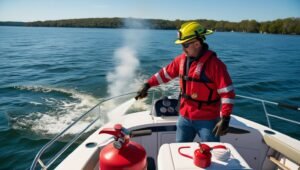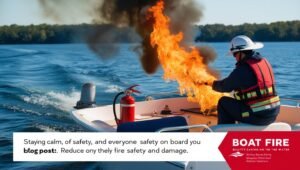
What do you do when a fire breaks out in front of your boat?
Fire safety on the water is an important aspect of boating that is often overlooked until it is too late. Although boats are designed for fun and adventure, they can become increasingly dangerous in the event of a fire. This blog post will guide you through the steps you should take in the event of a fire on the front of your boat, ensuring you protect yourself, your passengers, and your vessel. can work quickly and efficiently for

1 Stay calm and assess the situation
The first and most important step in any emergency is to stay calm. Panic can lead to poor decision-making and put everyone on board at greater risk. Take a moment to assess the situation:
Identify Sources Determine where the fire started and what may have caused it. Common causes include fuel leaks, electrical problems, or cooking accidents.
Increase Fire Size Estimate the size of the fire. Is it a small fire, or is it spreading quickly
2 Alert all on board
Notify everyone on board immediately of a fire. Use a loud, clear voice to make sure everyone hears the warning. If your boat is equipped with an alarm system or horn, use it to warn everyone, including nearby boats.
3 Dawn Life Jackets
Make sure all passengers are wearing life jackets before attempting to fight the fire or move the boat. This step is important, as it prepares everyone for the possibility of leaving the pot.

4 Cut fuel supply
If the fire is in the engine or near the fuel supply, your next step is to cut off the fuel. Stop the engine and close the fuel valves to prevent the fire from spreading. This step can help control the fire and minimize damage to the boat.
5 Use a fire extinguisher
Every boat should be equipped with fire extinguishers. Find the nearest and remember:
AIM AT THE BASE Aim the extinguisher at the base of the fire, where the flames are closest to the fuel source.
Side to Side Use a sweeping motion to cover the entire fire area.
6. Call for help
If the fire is out of control or spreading rapidly, you should call for help immediately. Use your VHF radio or mobile phone to contact the Coast Guard or other emergency services. Give them your location, the nature of the fire, and the number of people on board.
7 Ready to take off
If the fire cannot be contained and there is a significant danger, prepare to abandon the ship. Make sure everyone is in life jackets and move to the stern (rear) of the boat away from the fire. Follow these steps:
Deploy Life Raft If your boat has a life raft, deploy it and help the passengers aboard.
Enter the water safely If there is no life raft or it is inaccessible, enter the water safely away from the fire.
8 Precautions
Preventing a fire is always better than fighting it. Here are some precautions you can take:
Regular Maintenance Maintain your boat well, paying special attention to the electrical and fuel systems.
PROPER STORAGE Store flammable materials and fuel in appropriate containers and away from possible ignition sources.
Fire Drills Conduct regular fire drills with your crew or passengers to ensure they know what to do in an emergency.
result
A boat fire can be a terrifying experience, but being prepared can make all the difference. By staying calm, acting quickly, and following the steps outlined in this blog post, you can reduce the risk of injury and damage. Remember, the safety of everyone on board should always be your top priority. Regular maintenance, safety drills, and a well-equipped boat are your best defenses against the devastating effects of fire on the water.
Call to Action
Share this blog post with your fellow boating enthusiasts and help spread the word about fire safety on the water. Together, we can ensure that every boating trip is safe and enjoyable. This blog post is designed to be informative and actionable, providing boaters with clear steps to take in the event of a fire. By focusing on the practical

1: What is the first step to take when a fire breaks out in the front of your boat?
The first step is to stay calm and assess the situation. Panicking can lead to poor decision-making. Identify the source of the fire and its severity to decide on the best course of action.
2 How should you alert others on board about the fire?
Immediately alert everyone on board using a loud, clear voice. If your boat is equipped with an alarm system or horn, use it to ensure everyone, including nearby boats, is aware of the emergency.
3 What should be done to prevent the fire from spreading to the fuel source?
Cut the fuel supply by turning off the engine and closing the fuel valves. This action can help prevent the fire from escalating and spreading to other parts of the boat.
4 What is the correct way to use a fire extinguisher on a boat?
Aim the fire extinguisher at the base of the fire, where the flames are closest to the fuel source. Use a sweeping motion from side to side to cover the entire area of the fire. This method helps to effectively smother the fire.
5 What preventive measures can be taken to avoid fires on boats?
Preventive measures include regular maintenance of the boat’s electrical and fuel systems, proper storage of flammable materials, and conducting regular fire drills with passengers and crew. Educating everyone on board about fire safety and emergency procedures is also crucial.
result
An essential component of boating that is frequently disregarded until it is too late is fire safety on the water.
In the event of a fire on the bow of your boat, this blog post will walk you through what to do to protect your passengers, yourself, and the boat.
Remaining composed is the first and most crucial thing to do in any emergency.
Fuel leaks, electrical issues, and cooking mishaps are common causes.
Check that everyone on board is wearing a life jacket before trying to put out the fire or maneuver the boat.
You can lessen the chance of harm and damage by remaining composed, moving fast, and adhering to the instructions provided in this blog post. Keep in mind that everyone’s safety should
